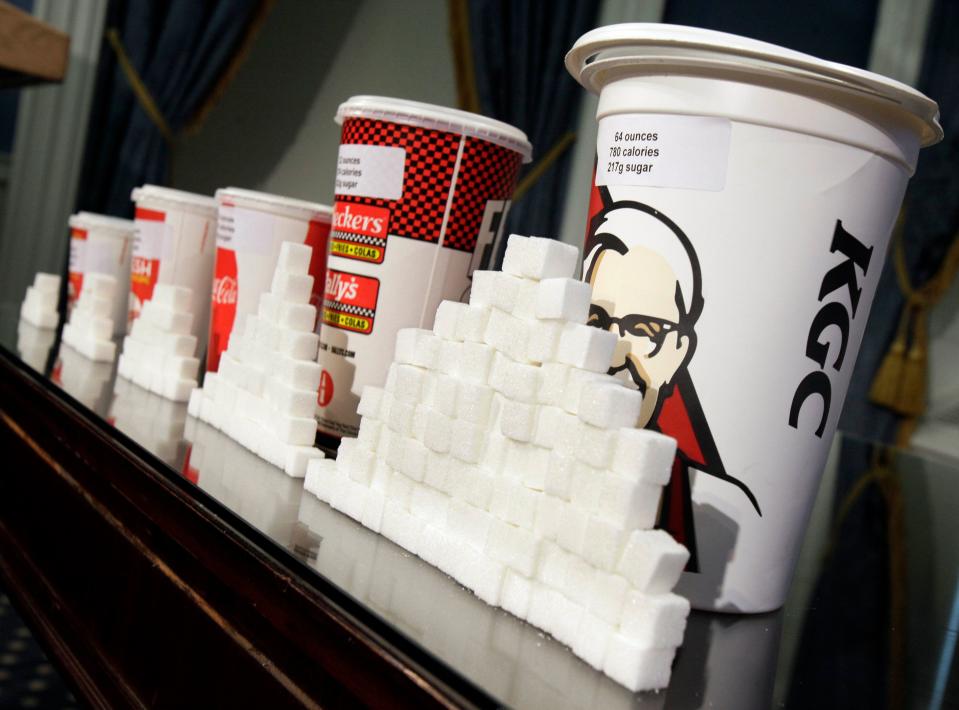Why we're endorsing tax hikes and other ways to limit sugary drinks for kids

Every child in every community deserves to grow up healthy. That’s why our respective organizations, the American Academy of Pediatrics and the American Heart Association, just released a landmark joint policy statement endorsing a suite of public health measures — including excise taxes, limits on marketing to children, and financial incentives for purchasing healthier beverages — designed to reduce kids’ consumption of sugary drinks.
The ubiquity of sugary drink products and ads in our communities is cause for great concern. In the United States, 40,000 deaths every year are attributed to heart problems caused specifically by consuming too many sugary drinks. On average, children and teens today consume more than 30 gallons of sugary drinks every year; that’s enough to fill a bathtub.
These drinks — including sports drinks, fruit-flavored drinks and sodas — are now the largest source of added sugars in their diets. With beverage companies spending hundreds of millions of dollars in a marketing onslaught for these products annually, most teens are seeing at least one ad for a sugary drink every day. Children from minority and low-income communities are disproportionately impacted and targeted.

Read more commentary:
Taxing our soda and interfering with our diets won't always result in slimmer waistlines
Government can't get us off sugar: Glenn Reynolds
Donald Trump's budget slashes government junk food pipeline to the poor
Over the years, we have seen firsthand in our respective pediatric and cardiovascular practices the consequences associated with easy access and constant exposure to these drinks. Twenty years ago, for example, it was quite rare for one of our younger patients to be diagnosed with Type 2 diabetes. These days, though, it’s not out of the ordinary at all.
As physicians, we know the importance of quality, affordable and accessible medical care. But we also know that much of what affects our patients’ well-being, and the degree to which they’re able to live long and healthy lives, happens outside of doctors’ offices.
Those of us in the medical profession have a responsibility to not just treat the sick, but also to prevent disease and keep our patients healthy in the first place. It is not enough to simply lament this state of affairs. We must act to change the paradigm.
Sugary drinks are bad for kids' health
The evidence is irrefutable: Sugary drinks pose significant risks to our children’s health, including tooth decay, diabetes, obesity and heart disease. The good news, however, is these risks and conditions can be prevented, and evidence-based policy solutions can play a major role in that effort.
Our policy statement, “Public Policies to Reduce Sugary Drink Consumption in Children and Adolescents,” includes the following evidence-based recommendations:
►Local, state and national policymakers should consider raising the price of sugary drinks, such as via an excise tax, along with an accompanying educational campaign. Tax revenue should go in part toward reducing health and socioeconomic disparities.
►Federal and state governments should support efforts to decrease sugary drink marketing to children and teens.
►Healthy drinks such as water and milk should be the default beverages on children’s menus and in vending machines, and federal nutrition assistance programs should ensure access to healthy food and beverages and discourage consumption of sugary drinks.
►Children, adolescents and their families should have ready access to credible nutrition information, including on nutrition labels, restaurant menus and advertisements.
►Hospitals should serve as a model and establish policies to limit or discourage purchase of sugary drinks.
Our organizations are endorsing these policies, quite simply, because they have been proven to work.
Tax hikes on sugary drinks work to help kids
To take one example, this policy statement is the first time the American Academy of Pediatrics has recommended taxes on sugary drinks. Excise taxes on sugary drinks have been successful on multiple fronts. In Berkeley, California, consumption dropped 52 percent among low-income residents between 2015, when the tax took effect, and 2018. In Philadelphia, Pennsylvania, kids who drank about 20 ounces of sweetened beverages a day before the tax started in 2017 dropped their consumption by 22 percent during the first year the tax was implemented.
Furthermore, cities have reinvested the revenue generated by these taxes to fund critical health priorities. More than 2,000 prekindergarten seats in Philadelphia. Clean drinking school water fountains in Oakland, California. Early learning programs and community college scholarships in Seattle. Nutrition and oral health programs in San Francisco.
Taxes, limits on marketing and other policies helped significantly reduce tobacco rates and will have a similar impact on bringing down rates of sugary drink consumption. Our organizations are proud to stand with communities that are developing creative solutions and working to make healthy options more widely available and less expensive to buy.
With this statement, we reaffirm our commitment to a brighter future for all our children.
Kyle Yasuda is president of the American Academy of Pediatrics and clinical professor emeritus of the University of Washington School of Medicine. Ivor J. Benjamin is president of the American Heart Association and director of the Cardiovascular Center at the Medical College of Wisconsin. Follow them on Twitter: @AAPPres and @ivorbenjamin2
You can read diverse opinions from our Board of Contributors and other writers on the Opinion front page, on Twitter @usatodayopinion and in our daily Opinion newsletter. To respond to a column, submit a comment to letters@usatoday.com.
This article originally appeared on USA TODAY: Why we're endorsing tax hikes and other ways to limit sugary drinks for kids

